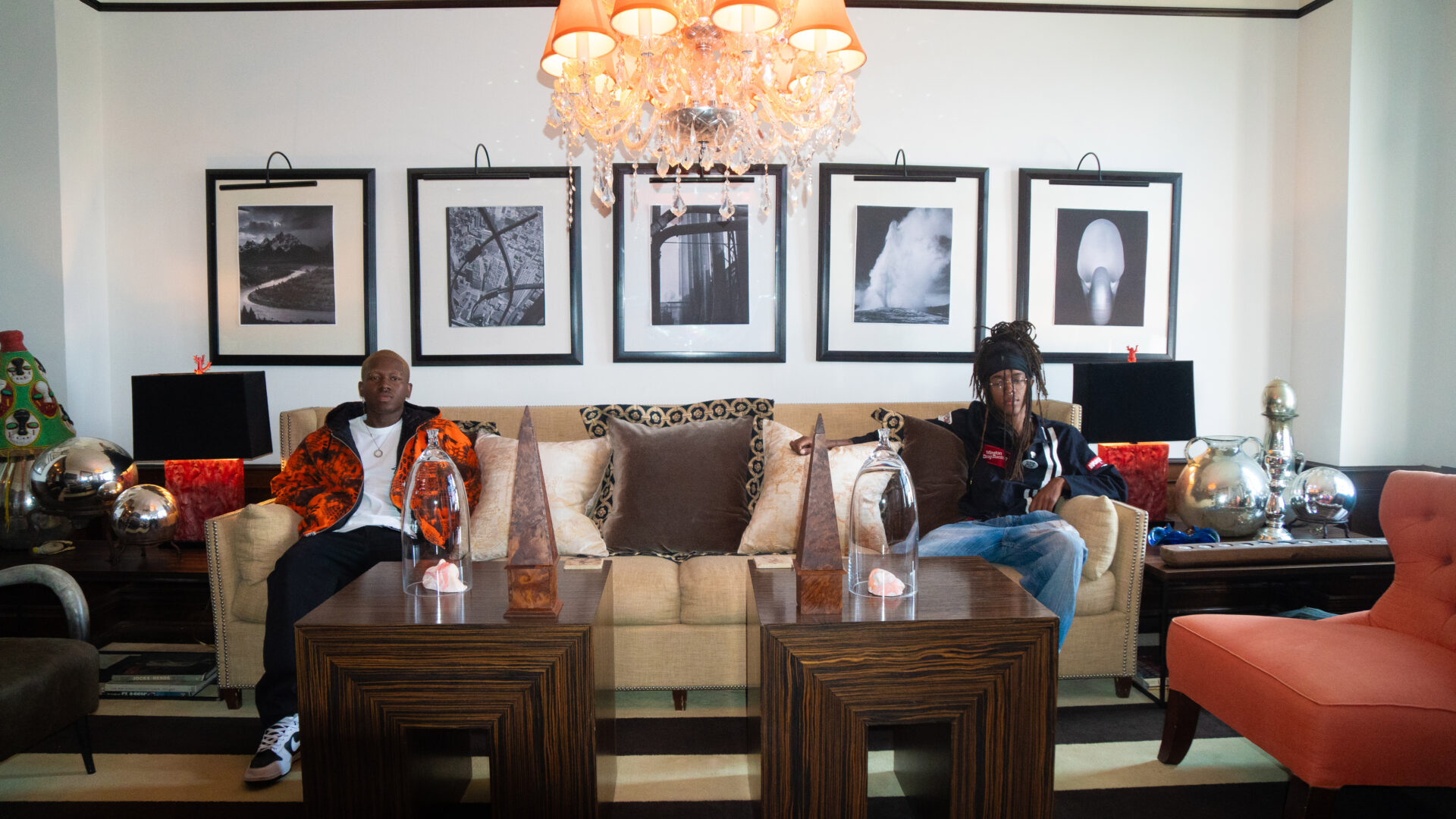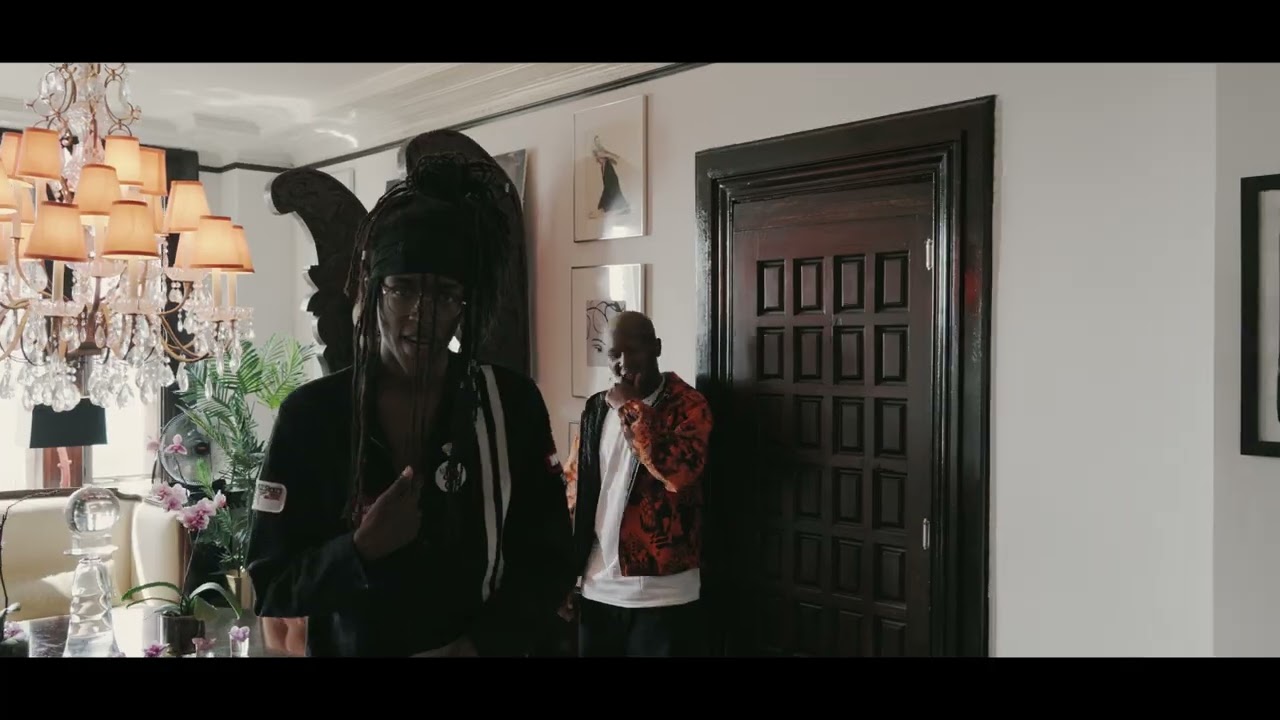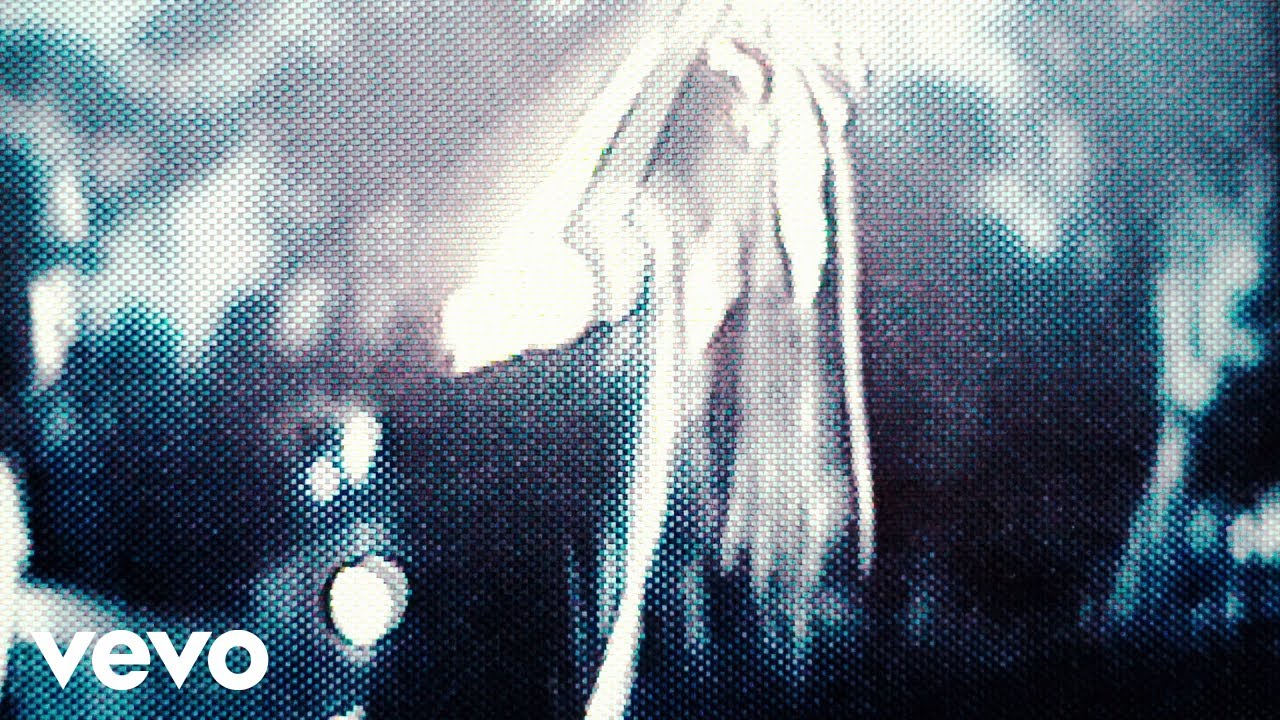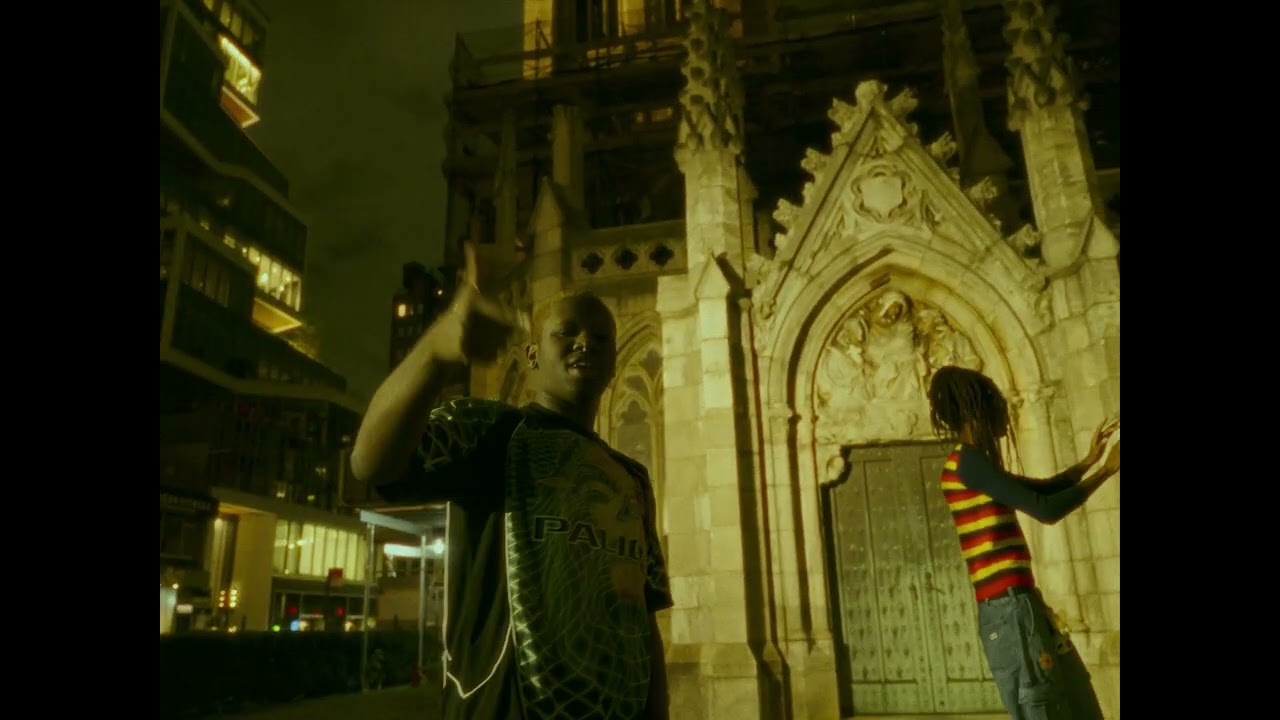“We had known each other for years online because we were hanging out in the same Discord servers with different homies.” Dorian Williams, AKA 19-year-old rapper-producer FearDorian, is filling me in on how he and collaborator Quinn Dupree, the 20-year-old who records as osquinn, first connected. It’s a reasonably routine meeting story for two Gen Z teenagers, but one that he certainly hasn’t taken for granted as their friendship has grown since. “There are definitely people I have met in real life after talking to them online and it’s like, you’re very awkward in person,” he says. “It wasn’t like that at all when we met though – it felt like we had been hanging out forever.”
Quinn, the child of a military family who had spent much of her teens moving around different parts of the US having been born in Baltimore, first made the real-life connection with Dorian after moving to Columbus, Georgia with her parents. “It’s about an hour-and-a-half outside Atlanta,” Quinn says. “Atlanta was the closest major city, and Dorian was the only person that I knew up there. I knew that was where I was gonna live next, so it felt meaningful to start making some connections there. He was the first and main connection that I made in Atlanta.”
Soon, flippant online conversations amid shared viewings of various movies and TV series such as Euphoria had turned into a deeper, more authentic bond as the two discovered a shared sense of humour and, most significantly, a mutually unique curiosity for different sounds that belied their adolescence. Though their solo and collaborative work is most succinctly filed away as rap music, they connected over different hardcore and indie records that they loved, in addition to cult SoundCloud rappers such as Duwap Kaine. That eagerness to discover music that is new to them both endures now also. While talking about some of his favourite recent music discoveries, for example, Dorian name-checks releases from defunct Swiss electro-industrial group Swamp Terrorists and Belgium’s Stroom label, as well as a Melt-Banana album that he picked up for $1 at a record store.
As rappers and beat-makers, Dorian and Quinn champion a sample-heavy, DIY brand of hip hop that folds in all of their musical influences. ‘Las Vegas’, a link-up between the two artists that appeared on Dorian’s excellent coming-of-age album Leaving Home earlier this year, for example, pairs lo-fi 808s with a cheekily employed loop from a Cocteau Twins classic. That’s just one of a few tracks that the duo have worked on together in recent years amid their friendship growing into a fruitful working relationship, which has built to the recently released joint LP Before You Press Play.
The 12-track record is a feverishly fun journey through sharply delivered quips and charmingly unfussy instrumental loops that reference everything from Jersey club (‘L train vintage’) and james K’s dream pop (‘duh’) to classic SoundCloud rap (‘kiss of death’) and the alt-pop of Imogen Heap (‘tmb’). Though simple in its lo-fi design, and all the better for it, it’s also one of the longest projects that the two artists have spent their time putting together. “We started working on this last year, and usually I’m quite a fast worker,” Dorian says. “My past three solo records were all done over the course of a couple of months.”
Quinn also admits to being a fast operator, but, describing that as a bad habit, says she’s learning to sit longer with individual tracks and flesh ideas out further before moving on. “With this specific project, it took a few different versions to get what we wanted,” she explains. The seeds of the record came from some shared studio time in New York having been encouraged by their manager to enter into a more professional setting for a collaborative writing and production session. “I’m not too fond of the big studio; it’s not my forte,” Dorian admits, though, when recalling those early joint experiments. Quinn concurs.
“Being in a room with other people comes with more pressure,” Dorian says, when asked why he’s not a fan of fancy studios. “I personally prefer recording myself. It feels a little unnatural [in the studio]. As time goes on, I recognise that I will probably be in those settings a little more though, even if it’s working on beats for other artists. I also don’t like recording in front of people.”
Quinn isn’t shy about working around strangers, she says, but she simply prefers to work to her own schedule. “All these people came to see you do something, and that feels weird, like, ‘I’ve gotta do this now?’ I don’t like the person behind me expecting something to be done by the time we leave. The studio time was paid for so there’s this obligation to do something with it.”
The two artists first broke through in underground circles as producers, having taken up beat-making in their mid-teens against the backdrop of the COVID-19 pandemic. Emerging with her debut studio album, Drive-By Lullabies, in 2021, Quinn’s early sound embraced digicore, hyperpop and trap metal, and earned her cosigns from acts like 100 gecs. Dorian’s early production experiments with plugg and cloud rap, meanwhile, provided a bedrock for tracks by the likes of New York rapper Xaviersobased and figures associated with the Surf Gang collective. It was only last year that he finally decided he had something worth saying and began to share songs with his own vocals on them, resulting in the release of his self-titled debut album.
“When I first started making music, I wanted to rap,” Dorian says. “I tried to do it at the start but I didn’t like it, and I decided I wasn’t ready for it. I still wanted to make music and didn’t want to completely give up, so that’s when I started making beats. One reason I started rapping was because I really admired artists who would make their own beats, like Earl [Sweatshirt] and Pi’erre [Bourne].
“It was therapeutic at the time for me too. I feel like when you’re a teenager – I say that while I am still a teenager – there’s a lot of – and people love this word – angst,” he adds, through stifled laughter. Getting over initial hang-ups with his voice, and finding his own sense of flow, were also significant hurdles in his journey to becoming the artist he is now. “I’m from Atlanta, but I don’t think I have an accent. My voice has no swag, and other people tell me that I talk kinda proper. It can be quite jarring at first to listen back to a song and know it’s your voice. You get used to it eventually, but I had to grow into that in a literal and figurative sense.”
Quinn’s push into adding her own vocals to her work also required a lot of patience, she says. “I would have lyrics in mind for beats, but I just didn’t know how to incorporate them into what I was making. Knowing how to do it came with learning how to engineer beats in more detail. I also had to learn to like my voice, and I feel like that’s something not enough people talk about.”
Speaking with the two artists over the course of an hour, it’s evident that they’re kindred spirits of sorts, and not just in their common musical interests and sample-happy approach to production. Their respective styles match effortlessly on Before You Press Play, so what is it that they feel works so neatly between them when it comes to making a full body of work as a pair?
“We have a similar thought process about being an artist,” Dorian says. “We think long-term about how we want our legacies to look. It obviously helps that we’re into all the same things so can bounce ideas off each other pretty easily, but if myself and Quinn didn’t have the same vision with what we want to change within our sphere of music, then we wouldn’t be able to make anything together.”
It’s for that reason that Quinn says she’s selective when it comes to releasing music collaboratively. “Dorian is the only artist I’ve dropped a full project with. I don’t know if it’ll stay that way, but there’s a high chance that it might. If I’m working with somebody, they also need to have a long-term vision of what they want the reception for the project to look like in five years from now. We can’t just be putting things out that are gonna leave us with a foolish-looking digital footprint. I hate to have to care about that, but when you’re an artist trying to build a career, you do have to. I want to make sure my artistic integrity is protected.”
Before You Press Play is a notable milestone for Dorian as the first project for which he’s actively taken time to sit down and write lyrics. Having previously favoured a more aloof, freestyle-based approach to laying down vocals, the time at the New York studio encouraged him to try out something new. “When you’re in your room, it’s easier to freestyle and play the whole beat, say nothing and mumble to make up a flow,” he explains. “I feel like it’s not very appropriate to do that in a studio because I’m wasting time. It’s crazy because I feel like it’s noob-ish to not write. Looking back, I think, ‘Damn, I should have been writing.’” Dorian also describes Quinn as an “amazing writer,” a belief which he says gave him an extra push to sit down and take a more intentional approach to his bars on their joint LP.
“I have to write,” Quinn says, conversely. “When I freestyle, I feel like I’m repeating myself. I forget the last line as soon as I’m punching in the next one. I like to have consistent subject matters within at least four bars of each other, and I don’t like repeating myself or feeling redundant with what I’m saying.”
While Dorian feels being around Quinn has helped him to become a better writer, Quinn’s relocation to Dorian’s base of Atlanta at the start of 2024 – which she describes as a “Hail Mary” having “burnt all [her] bridges in Columbus” – has also had its benefits. “Being in a place where you feel like you belong does wonders for your confidence, and not only did I feel like I belonged here, I also felt like I was contributing something to the local scene,” she says. That was a notable factor in her deciding to stay in the Georgian city having not maintained a significant base of contacts in other places she’d lived in the past.
Though a fixture of Atlanta’s underground rap scene – and having grown up listening to local mainstream mainstays such as Migos, Playboi Carti and Lil Yachty – Dorian frequently finds that a lot of people assume he’s from elsewhere due to his presence on mixed-genre bills and his use of emo and indie samples in his work. “When people go into listening to rap music from Atlanta, they expect trap, and one very specific version of trap,” he says. “I’m still loosely inspired by a lot of Atlanta music, but people expect Atlanta rap to sound like one thing, so they don’t really expect me to be from here.”
Regardless of what preconceptions people might have about their music, it’s clear that Dorian and Quinn are happy to be charting their own respective paths within the local and wider rap scene. Having spoken in press notes for Before You Press Play about wanting to “put personality and vulnerability back in music,” I ask if these are characteristics they feel are lacking from a lot of current releases within mainstream hip hop. Though wary of sounding like a music snob, Dorian believes that some artists hide their personas and output behind an unhealthy wall of irony.
“Kids absolutely love that shit, but it masks a lot of toxicity sometimes too,” he says. “You have people like Dave Blunts being hella transphobic and homophobic, and telling the white fans at his shows that they can say ‘the hard R’. Kids eat shit like that up, and I don’t think it should have a place in music at all. All of that toxic shit needs to go out of the window. There should be fun music, but that doesn’t equal being a dickhead.”
Complacency is also a big problem within a lot of current music, Quinn feels. “People will listen to something and just think it’s good, but that’s it. There’s no desire to look further. A lot of people get comfortable and feel like their sound has developed far enough, but I feel like if you are really an artist at heart, there is no such thing as ‘far enough’. You should never be completely satisfied. Satisfaction isn’t really the mission. The mission is to keep expressing and challenging yourself. If you can only express yourself by using somebody else’s template, that’s fine, as long as there’s not too many of y’all.”
Without missing a beat, Dorian instantly claps back with a giggle: “Nah, fuck all that, there’s too many n***as out here picking up the mic.”





